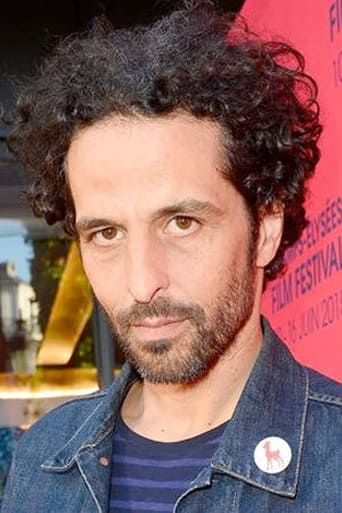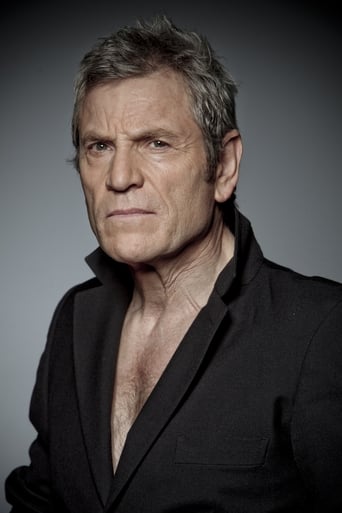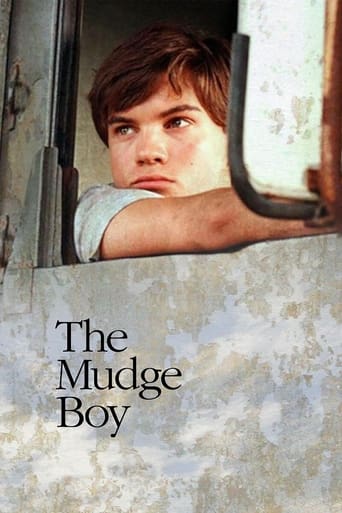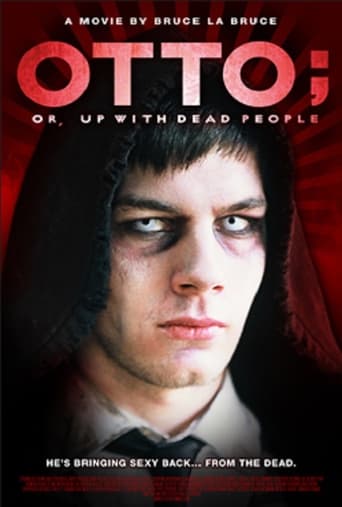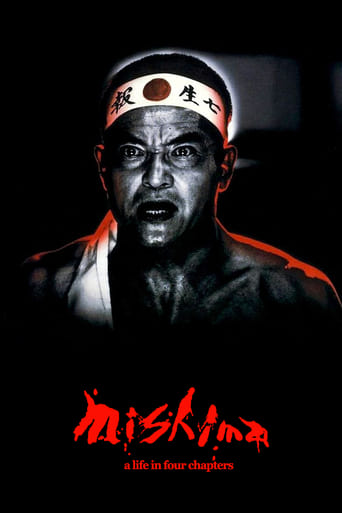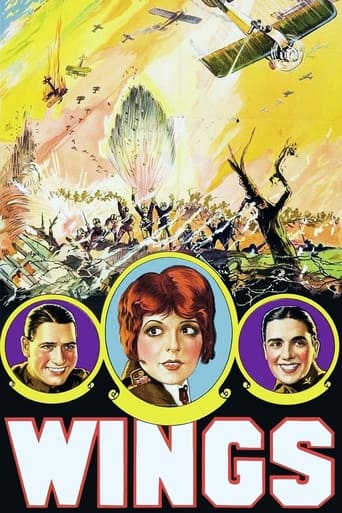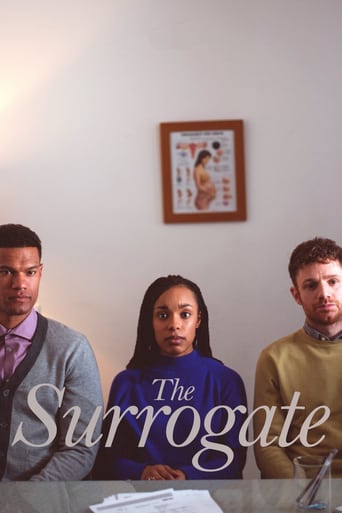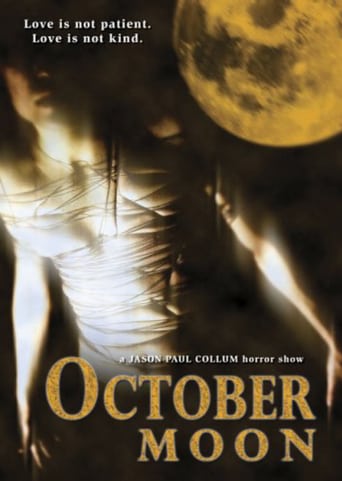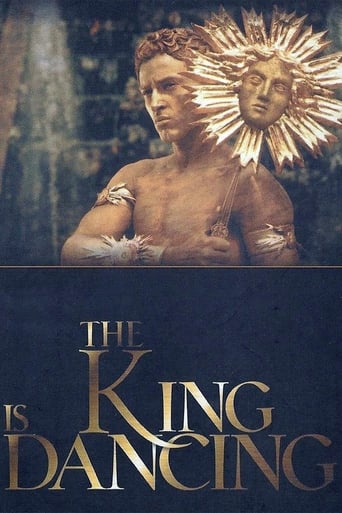

The King Is Dancing (2000)
Louis XIV, the French sun-king has two passions, establishing absolute rule over the realm -after decades of religious/civil wars- by divine right and artistic brilliancy as a dancer
Watch Trailer
Cast


Similar titles
Reviews
Simply Perfect
Good story, Not enough for a whole film
The best films of this genre always show a path and provide a takeaway for being a better person.
Exactly the movie you think it is, but not the movie you want it to be.
Not familiar with the history within which the film and its characters are set, I am unable to comment on its accuracy or faith to the people and times the film depicts in grand and lavish style. This, perhaps, is a good thing as I can appreciate the film as a film and it is an incredibly beautiful one. However, beneath the beautiful veneer is a bitter-sweet story of one court musician's (Lully) creative passion and unrequited love for the king (Louis) he served.As with many historical pictures the powers and machinations of the French court are apparent: in Lully's struggle to gain French citizenship and acceptance, as a former Italian, based on his musical gifts and patronage of the king; also in Louis's desire to utilise the arts for political power. Lully rises to power and as he does so his fervent devotion to the king becomes an obsession that will dominates Lully's life. As Lully tells the hapless Moliere, "I choose between him and you, my friend. He is fickle. He loves only his glory, but I love him. He's the best of me." The young king is shown as lonely and unhappy, estranged within the court from his mother he indulges his passion for music and dance through Lully, who makes of the king a dancer. This early bond through music is manipulated by Louis later for political ends, with Louis becoming increasingly narcissistic and cruelly remote towards Lully. Louis's narcissism is well evoked; for example, in one scene where, rehearsing a dance in which Louis is the sun, Louis tells Lully to "adjust the movement of the planets. The planets do not brush against the sun. They allow it to shine." The evolution of the relationship between Lully and Louis hurts both men who in turn hurt those around them. Neither are sympathetically portrayed and yet moments of vulnerability make it hard to dislike them or condemn them outright. Louis, as much from political necessity as cruelty, tells Lully he is not his friend as the king has no friends. This line is repeated at later intervals by Lully as he cuts ties with people in a ruthless and desperate struggle to stay important to the king.Lully loves the king. What the king feels for Lully is less clear although there are blurred lines suggesting more feeling from Louis to Lully than was expressed. The final scene of the film shows a melancholic Louis without music in his life now that Lully has died. Music functions as a thematic metaphor throughout the film for life, love and bounty yet it is destructive too as first Louis and then Lully injure themselves in its service. Lully's injury proves fatal to him. The film is infused with Lully's music adding an aural splendour to the visuals on display and doing justice to his music. The dance scenes and those between Lully and Louis are executed exceptionally well. Reputed to have been one of the most expensive French productions, it is easy to believe as the film is so detailed and rich.
le roi danse feels like a french response to the excellent film "amadeus." a beautiful costume film with sumptuous scenes of dance and song, it takes its liberties with historical accuracy. we never get too deep into the characters louis xiv, lully or moliere, but with hints of obsessions (homosexual or otherwise) here and there, we understand them all well enough. if you're looking for something entertaining this film will undoubtedly please, though it won't make you think too hard. many of the reactions viewers have are probably quite visceral -- though the film talks about the loftiness of dance, it deals with the most basic of human motivations and feelings, of jealousy, lust, desire, horror even. there are a few wince-worthy moments (not for the squeamish), two specifically seem to book-end the film. they're not explicit, just painful, so the squeamish should be okay once these moments pass. le roi danse is not a terribly deep movie, but there's enough there to feel compelled by the characters, thus this is still compelling and astoundingly beautiful. on top of the great visuals and direction, excellent acting by magimel, terral and karyo all.
Having just seen this film I was impressed and intrigued enough to want to comment on it.The subject is quite unusual-the life,rise and court of the famous French king Louis the fourteenth,the famous "sun king" as seen by his court musician,the not least famous Lully. The style,imagery,artistic means of this film reminded me of another much talked about film which also deals with a composer,Forman's Amadeus-in both films we see certain taste for the dramatic, even overtly theatrical,for haunting and often violent scenes,for the grotesque and almost disturbing. However I prefer a more disturbing,uncomfortable view of history than the typical Hollywood style of idealizing historical characters whether if actually good,bad or just complex(a mixture of good and bad,like most historical characters and most people really are). The film is historically somewhat biased,mainly for two reasons: 1.though an important part of Louis's reign,Lully's music wasn't the most important affair of state,yet in this film it is depicted as if it were the only reason of existence for France,the king,s family,his court 2.Lully and Moliere weren't the only artists to contribute to the glamor,luxury,power,glory,cultural achievements and distinctive style always linked with the sun-king's reign-there were also architects like Le Brun,Le Vau,Le Notre,tragedy-play writes like Corneille and Racine,literary critics like Boileau,carpenters like Boulle and many other,among whom even the tens of thousands of laborers,who died or became ill while turning,with immense efforts and during decades of relentless work,the inhospitable marshes of Versailles into Europe's most famous and glamorous royal residence... The sun-king is depicted in an awkward,somewhat strange way:the immense opulence of his lifestyle is known,however I always pictured him much more formal and reserved,almost arrogant,distant in his majestic dignity,exhaling a spartan sobriety and god-like greatness out of every pore. Without being a parody or caricature of the real Louis,I often got quite the opposite of what I expected-he seems to me vulnerable,lonely,often unloved and misunderstood,unbalanced,craving for appreciation and success(historically,these attitudes can be partly explained by the fact that Louis was at the beginning of his reign,before he gradually became an absolute ruler). And Louis dances...Russel's The Devils seems to anticipate this film,as we see that also Louis the thirteenth,none else than the sun king's father is also depicted as a music-lover,an innate artist rather than a monarch(remember Russel's creation and how the French king from that film was depicted wearing almost the same elaborate costumes and performing almost the same histrionic,yet fascinating dance movements),however Russel's intention was to detract French monarchy as decadent,capitalizing on the homophobic reactions the king's slightly effeminate clothing and gesture might cause,especially to the more conservative viewer. A certain homo-erotic message is undoubtedly present,however not in order to deconstruct the myth of the sun-king,it is often hinted how hard it is for Lully,who anxiously tried to closet his bisexual desires and fit into the heterosexual mainstream,to keep his secret love for the king hidden well,even if strictly heterosexual in his private life it is a historical fact that Louis the fourteenth is known to have been an extremely good-looking man and therefore likely to attract admirers of both genders-I think the actor playing Louis is a good choice as he both resembles the historical character and is handsome enough to justify Lully's crush,however a profssional dancer would have also depicted truthfully Louis the showman rather than the politician(or a politician trough his on-stage extravaganza,as an expression of power and a manipulatuive technique),this very side of the king's personality would have been the ideal part,even more than for Magimel or Tarding for brilliant real-life performers Nurejew or Baryshnikow.Another historical character with whom the sun king might be compared is the Emperor Nero-he too build an impressive,megalomaniac palace as symbol of his absolute,almost divine power(Versailles being a baroque version of the legendary Domus Aurea-The House of Gold),both being fascinated of overindulgent self-marketing by comparing themselves to particularly grand and lavish imagery like the sun,the sun-god,gold and the golden age,both of them being known not only as protectors of art but also as performance-Nero scandalized the virtuous Romans with his acting and his often effeminate costumes and parts,just like young Louis shocked the Catholic circle gathered around his aging and strict mother and some exaggeratedly pious and narrow-minded aristocrats,which rather than understanding the beauty of art played the strict moralists(though often immoral themselves). In the end,as we also know from history,the sun-king succeeds to fulfill his dreams of magnificence,however at a high cost,among the ones who payed the price being eventually the court composer himself:Lully got injured while stubbornly insisting to conduct a Te Deum which his monarch didn't even honor with his presence,this injury getting infected and causing Lully's death(this is historical fact,Lully really died this way),the whole film being,like in Amadeus,a deathbed confession recalling the most important moments in the composer's life. Even if Lully's death appears as accidental,useless and stupid,it gave his life the ultimate meaning and apotheosis-by refusing to accept the amputation of the wounded body-part he ultimately sacrificed his life to his sovereign,being the perfect subject,faithful to his master till the end,giving both his work and his love for the king a noble and uplifting conclusion,defying&defeating all the rumors and irony spread by his many rivals.
Just arrived home from a jump into the 17th century at the royal court of Louis XIV. This film gives you an excellent inside look of one of the most protectors of the arts. You may find the story a bit thin, but the images are very carefully chosen and composed. It's not an ordinary costume show and happily made under the supervision of culture historians. Maybe the music does sound a bit the same during the film, but it also let you hear some magnificent moments. I enjoyed this movie very well because of the richness of the photography and the well balanced cast. I recommand this film to those who love western culture during one of the highest levels, the baroque.



